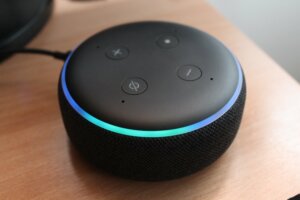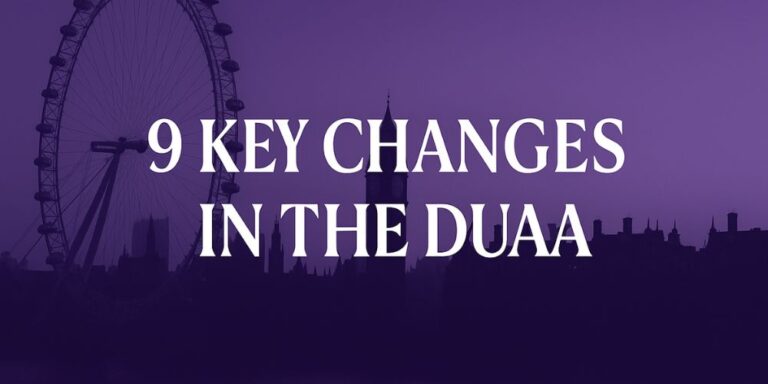Artificial Intelligence (or AI): a term you have no doubt heard numerous times already this week. It seems to be on the tip of everyone’s tongue, and the latest technology trend to take the world by storm. You will have witnessed the buzz around Chat GPT, and seen headlines about the potential risks of AI. However, there are many ways that AI is making positive headway, and we have been taking advantage of many of those uses for quite some time – whether we knew it or not.
There is no arguing that utilising the innovative, cutting-edge technology that AI can offer comes with risks. But it’s important to note that one of the key concerns surrounding AI is the lack of regulation – in the UK at least. The risk isn’t that AI is inherently is an insidious technology, but in fact, the way we utilise its capabilities is what matters.
So, with that in mind, this article looks at those daily uses, where AI is already having a positive impact on the way we use technology.
AI in Facial recognition
Most of the artificial intelligence coming into play each day is probably through the way you unlock your phone. We all open our smartphones dozens of times every single day, to respond to messages, check our emails, or scroll through social media. And each time that you do, your device is using your biometric data (facial features, fingerprint, etc).
The AI within these features is also getting better at adapting to ways your physical appearance could change – depending on factors like clothing, facial hair, or glasses. The more data your device is fed, the more it learns, and therefore, the more that this AI can perfect its function.
Virtual Assistants
Virtual assistants make a rather obvious example of artificial intelligence in action (since it’s the familiar style of “automated conversation with a robot” that sci-fi films have been giving us for years), but its prominence in our everyday tasks makes it an important one.
Programs like Siri and Alexa, for instance, use something called Natural Language Processing (NLP) to learn how natural conversations are supposed to sound. Through this, they’ve learned to speak with us in a way that feels quite close to how real human interactions go.

Healthcare
AI is making exciting strides in the world of healthcare. Thanks to this technology, machines are being developed that can detect and diagnose disease earlier, and with a higher success rate than humans are capable of.
For example, there’s a new AI software that can predict and diagnose breast cancer risk 30 times faster than a human can. This astounding technology is 99 per cent accurate, a significant step-up from the 50 per cent accuracy rate of mammograms performed in the US (according to the American Cancer Society). This will drastically reduce the number of unnecessary biopsies performed due to erroneous diagnoses – a fantastic achievement in the world of artificial intelligence that could very well prove life-saving.
Chatbots
We have all been frustrated by the opening hours of a customer services phone line, or the inconvenience of being on hold for long periods of time. Lots of organisations are now utilising AI powered chatbots to triage customer services conversations. Chatbots utilise algorithms that are programmed to answer frequently asked questions, take and track orders, or maybe manage contact information.
Even the feedback you provide at the end of those conversations is helping the technology get better; negative ratings and poor feedback help the Chatbot to “learn” more about its performance, and improve moving forward.
Utility providers, retail organisations, and even consultancies are making use of the technology to streamline customer service.
Social Media
We live in an age where most of the population has accounts on the likes of Facebook, Instagram, LinkedIn etc. These social media platforms are utilising AI to ensure that your experience with them is personalised, and therefore keeps you coming back.
AI assists the organisations in personalising what you see on your feeds, by learning what you have previously interacted with. This technology can also identify potential friend suggestions and filter out fake news. One of its most impactful features is the ability to work towards preventing cyberbullying, and protect you from harmful content.
Handy Apps
A more novel use, but one we are all familiar with. AI is being used to create applications that can assist us in day-to-day tasks.
For example, Planta is a handy app that can identify plants, and then provide you with a care routine to ensure that your house plants never miss another water.
Sticking with the nature theme, ChirpOMatic will help you to identify bird songs, with incredible accuracy, and of course, we couldn’t not mention the prolific Alexa, or Siri – on hand to answer a variety of questions.
There are more academic ones available too, for example, Grammarly – a typing assistant that reviews grammar, punctuation, and clarity, amongst other things.
Understanding AI
So, in conclusion, people are growing increasingly accustomed to having this technology right at their fingertips in ways that years ago, we would have never thought possible. It’s only inevitable that AI will continue to evolve and enrich our recreational experiences, opening up new horizons for our entertainment, security, and wellbeing.
It’s important for us to understand just what these tools can do so that we can ensure that we are implementing them in a way that is safe, and with due consideration to the risks.
Learn more about AI from us
To contribute to this understanding, we have a new course coming soon – AI for Data Protection Practitioners. Give this course a look if you want to learn about artificial intelligence, machine learning, and how to utilise this technology to your advantage as a data protection professional. It expands upon the BCS Essentials in AI, applying practical learning to prepare you to tackle AI issues in your day-to-day.
Click here to check this course out.









